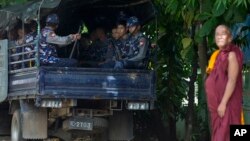Myanmar, also known as Burma, says it will not turn away from reforms in the wake of a controversial raid on a Buddhist monastery and the arrest of five monks.
Presidential spokesman Ye Htut said Tuesday that both the government and the military are committed to moving forward.
"Both our government and the military have decided to continue implementing the reforms. In doing so, [we] either step forward fast or slow. [If we have a] deterrent or not just depends on the vision of all parties involved. There's no possibility of turning back."
Earlier this month, police raided the Maha Thantithukha Monastery in Yangon. Five monks, who were disrobed and arrested, are now free on bail. Myanmar's Minister of Religious Affairs, Hsan Hsint, was later removed from his position after the raid because of corruption allegations.
Critics say the government used its power to settle a long-running dispute over control of the monastery while its popular abbot was overseas.
The government has also faced criticism in recent weeks over investigations into the financial records of private publications.
Political analyst Yan Myo Thein said the moves cause concern for reform advocates.
"If they [the government] continue taking this kind of actions, there will be doubts over its democratic reforms and national reconciliation process. On the other hand, disrobing of Buddhist monks and raiding of a Buddhist monastery are against the constitution," he said. "So I think that all these situations are kind of worrisome over democratic transition and national reconciliation."
Kyaw Min Swe, Editor-In-Chief of The Voice Newspaper, which is being investigated, said the main problem is a lack of transparency that causes rumors and misunderstandings.
But Sein Win, former Editor of Mizzima News, which is also being investigated, was less generous in his assessment of the situation.
He said, "Why all these happened is that because previous groups of people are still practicing previous ways of doing things, because they cannot just give up their own interests. In the beginning, they have claimed that there would be no more old practices and will move to a new system. But in reality, once their interests are compromised, their true skins are often revealed."
Authorities have not given a reason for their inquiries into the publications.
After decades of military rule, Myanmar began political reforms in 2011 that have won it mostly praise from the international community, which has lifted most, but not all, sanctions against the country.
This report was produced in collaboration with the VOA Burmese service.
Myanmar Pledges Commitment to Reforms After Controversies

YANGON —



